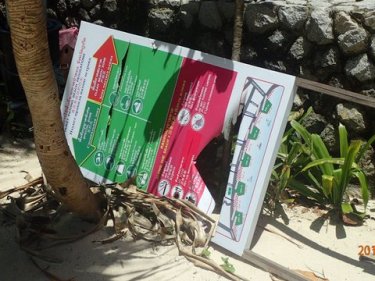Land Titles officers will descend on Patong on Friday to try to allocate five defined ''10 percent zones,'' with the plan still to have all the holiday island's beaches organised by the following Sunday, November 15.
Efforts to make Patong the model for all other beaches continue even though Patong Mayor Chalermlak Kebsub says the beach operators cannot be controlled.
She warned yesterday at yet another beach meeting that attempts to organise vendors into co-ops or associations would result in creating a power bloc of people who would try to exert their will on the beaches.
With little to show for the 16-month campaign to create a workable arrangement so far, Vice Governor Chokdee Amornwat suggested the large pots, filled with sand (and most likely later topped with trash) as a means of providing markers that could not be shifted to enlarge the 10 percent zones.
Workers who win the right to provide services in the ''10 percent zones'' would have to be responsible for cleaning 100 percent of the beaches, the vice governor said.
Mayor Chalermlak, meanwhile, insists that the poor vendors who will benefit from the scheme are mostly not poor at all but prefer life on the beaches to working in resorts.
''Any association of beach vendors is likely to quickly gain too much power and be hard to persuade,'' she advised.
Phuketwan and the University of Songkhla researchers who spent six months studying Phuket's beaches agree that an independent authority of some kind is essential to make sense of what should happen on the beaches.
No mention was made at yesterday's meeting of the jet-skis and speedboat parasails that operate in large numbers at Patong beach and make it useless as a ''role model'' for any other beaches.
Phuket's beach policy is definitely going even more potty.
To shed some light on what should happen, Phuketwan contacted the former Chairman of the Standing Committee on Tourism in the Senate, Tunyaratt Achariyachai. who shares the running of the Kata Group of resorts.
''The 10 percent zoning is for the vendors,'' she said. ''It has nothing to do with the tourists.''
Precisely why authorities are worried about the vendors when they should be worried about the needs of the tourists is a question Phuketwan has grown weary of asking.
''These people are not necessarily poor,'' she said. ''They just don't want to look for other jobs.''
Khun Tunyaratt believes that tourists should be able to bring their own equipment and sit where they like on any beach, instead of being scrunched up in the ''10 percent zone'' with others on hired mats.
''Tourists should be able to bring their own equipment and use it anywhere,'' said the former senator, who has a much better understanding of beach culture than many of the present authorities making the key decisions.
She also believes that it's time resorts, restaurants and municipal councils joined the lifeguards, provided by the Phuket Provincial Administrative Organisation, and made the beaches and the seas truly safe and secure for all tourists.
''Everybody has to make tourism safety and security their first priority,'' she said. ''It's increasingly important.''
More people understood that incidents involving putting tourists at risk reflected poorly on Phuket as a brand.
''There are fewer rip-offs than there used to be but we need to get rid of them altogether,'' she said.
Despite setbacks from time to time, she believed Phuket's popularity with Chinese travellers and other groups will continue to grow because there is so much to do now on Phuket over several days, as well as the appealing beaches and reefs.





Permanent massage platforms have returned in numbers to Nai Harn. Sad day...looks like faded laundry hanging from the umbrellas
Posted by Bodysurf Nai Harn on November 4, 2015 10:13